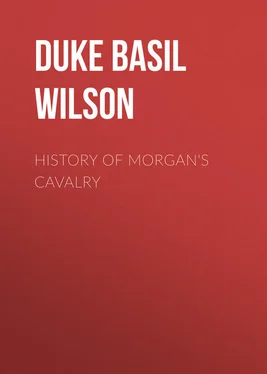Basil Duke - History of Morgan's Cavalry
Здесь есть возможность читать онлайн «Basil Duke - History of Morgan's Cavalry» — ознакомительный отрывок электронной книги совершенно бесплатно, а после прочтения отрывка купить полную версию. В некоторых случаях можно слушать аудио, скачать через торрент в формате fb2 и присутствует краткое содержание. Издательство: Иностранный паблик, Жанр: foreign_antique, foreign_prose, на английском языке. Описание произведения, (предисловие) а так же отзывы посетителей доступны на портале библиотеки ЛибКат.
- Название:History of Morgan's Cavalry
- Автор:
- Издательство:Иностранный паблик
- Жанр:
- Год:неизвестен
- ISBN:нет данных
- Рейтинг книги:3 / 5. Голосов: 1
-
Избранное:Добавить в избранное
- Отзывы:
-
Ваша оценка:
- 60
- 1
- 2
- 3
- 4
- 5
History of Morgan's Cavalry: краткое содержание, описание и аннотация
Предлагаем к чтению аннотацию, описание, краткое содержание или предисловие (зависит от того, что написал сам автор книги «History of Morgan's Cavalry»). Если вы не нашли необходимую информацию о книге — напишите в комментариях, мы постараемся отыскать её.
History of Morgan's Cavalry — читать онлайн ознакомительный отрывок
Ниже представлен текст книги, разбитый по страницам. Система сохранения места последней прочитанной страницы, позволяет с удобством читать онлайн бесплатно книгу «History of Morgan's Cavalry», без необходимости каждый раз заново искать на чём Вы остановились. Поставьте закладку, и сможете в любой момент перейти на страницу, на которой закончили чтение.
Интервал:
Закладка:
Men are not often born who can wield such an influence as he exerted, apparently without an effort – who can so win men's hearts and stir their blood. He will, at least, be remembered until the Western cavalrymen and their children have all died. The bold riders who live in the border-land, whose every acre he made historic, will leave many a story of his audacity and wily skill. They will name but one man as his equal, "The wizard of the saddle," the man of revolutionary force and fire, strong, sagacious, indomitable Forrest, and the two will go down in tradition together, twin-brothers in arms and in fame.
CHAPTER III
The position assumed by Kentucky, at the inception of the late struggle, and her conduct throughout, excited the surprise, and, in no small degree, incurred for her the dislike of both the contending sections.
But while both North and South, at some time, doubted her good faith and complained of her action, all such sentiments have been entirely forgotten by the latter, and have become intensified into bitter and undisguised animosity upon the part of a large share of the population of the former.
The reason is patent. It is the same which, during the war, influenced the Confederates to hope confidently for large assistance from Kentucky, if once enabled to obtain a foothold upon her territory, and caused the Federals, on the other hand, to regard even the loudest and most zealous professors of loyalty as Secessionists in disguise, or, at best, Unionists only to save their property. It is the instinctive feeling that the people of Kentucky, on account of kindred blood, common interests, and identity of ideas in all that relates to political rights and the objects of political institutions, may be supposed likely to sympathize and to act with the people of the South. But a variety of causes and influences combined to prevent Kentucky from taking a decided stand with either of the combatants, and produced the vacillation and inconsistency which so notably characterized her councils and paralyzed her efforts in either direction, and, alas, it may be added, so seriously affected her fair fame.
Her geographical situation, presenting a frontier accessible for several hundreds of miles to an assailant coming either from the North or South, caused her people great apprehension, especially as it was accounted an absolute certainty that her territory (if she took part with the South) would be made the battle-ground and subjected to the last horrors and desolation of war. The political education of the Kentuckians, also, disposed them to enter upon such a contest with extreme reluctance and hesitation.
Originally a portion of Virginia, settled chiefly by emigration from that State, her population partook of the characteristics and were imbued with the feelings which so strongly prevailed in the mother commonwealth.
From Virginia, the first generation of Kentucky statesmen derived those opinions which became the political creed of the Southern people, and were promulgated in the celebrated resolutions of '98, which gave shape and consistency to the doctrine of States' Rights, and popular expression to that construction of the relations of the several States to the General Government (under the Federal Constitution), so earnestly insisted upon by the master-minds of Virginia. The earlier population of Kentucky was peculiarly inclined to adopt and cherish such opinions, by the promptings of that nature which seems common to all men descended from the stock of the "Old Dominion," that craving for the largest individual independence, and disposition to assert and maintain in full measure every personal right, which has always made the people of the Southern and Western States so jealous of outside interference with their local affairs. It was natural that a people, animated by such a spirit, should push their preference for self-government even to extremes; that they should esteem their most valued franchises only safe when under their own entire custody and control; that they should prefer that their peculiar institutions should be submitted only to domestic regulation, and that the personal liberty, which they prized above all their possessions, should be restrained only by laws enacted by legislators chosen from among themselves, and executed by magistrates equally identified with themselves and appreciative of their instincts.
In short, they were strongly attached to their State Governments, and were not inclined to regard as beneficent, nor, even exactly legitimate, any interference with them, upon the part of the General Government, and desired to see the powers of the latter exercised only for the "common defense and general welfare."
Without presuming to declare them correct or erroneous, it may be safely asserted that such were the views which prevailed in Kentucky at a period a little subsequent to her settlement.
This decided and almost universal sentiment was first shaken, and the minds of the people began to undergo some change, about the time of, and doubtless in consequence of, the detection of the Burr conspiracy. Burr had been identified with the party which advocated the extreme State Rights doctrines, and his principal confederates were men of the same political complexion.
The utter uselessness of his scheme, even if successful, and the little prospect of any benefit accruing from it, unless to the leading adventurers, had disposed all the more sober minded to regard it with distrust. And when it became apparent that it had been concocted for the gratification of one man's ambition, the very people whom it had been part of the plan to flatter with hopes of the most brilliant advantages, immediately conceived for it the most intense aversion.
The odium into which Burr and his associates immediately fell, became, in some measure, attached to the political school to which they had belonged, and men's minds began to be unsettled upon the very political tenets, in the propriety and validity of which they had previously so implicitly believed. The able Federalist leaders in the State, pursued and improved the advantage thus offered them, and for the first time in the history of Kentucky, that party showed evidence of ability to cope with its rival. Doubtless, also, the effect of Mr. Madison's attempt to explain away the marrow and substance of the famous resolutions, which told so injuriously against the State Rights party every where, contributed, at a still later day, to weaken that party in Kentucky; but the vital change in the political faith of Kentucky, was wrought by Henry Clay. All previous interruptions to the opinions which she had acquired as her birthright from Virginia, were but partial, and would have been ephemeral, but the spell which the great magician cast over his people was like the glamour of mediæval enchantment. It bound them in helpless but delighted acquiescence in the will of the master. Their vision informed them, not of objects as they were, but as he willed that they should seem, and his patients received, at his pleasure and with equal confidence, the true or the unreal. In fact, the undoubted patriotism and spotless integrity of Mr. Clay, so aided the effect of his haughty will and superb genius, that his influence amounted to fascination. Although himself, in early life, an advocate of the principles of (what has been since styled) the Jeffersonian school of Democracy, he became gradually, but thoroughly, weaned from his first opinions, and a convert to the dogmas of the school of politics which he had once so ably combatted. The author of the American System, the advocate of the United States Bank, the champion of the New England manufacturing and commercial interests, with their appropriate and necessary train of protective tariffs, bounties and monopolies, could have little sympathy with the ideas that the several States could, and should, protect and develope their own interests without Federal assistance, that the General Government was the servant of all the States and not the guardian and dry nurse of a few – the doctrine, in short, of "State Sovereignty and Federal Agency." Mr. Clay fairly and emphatically announced his political faith in word and deed. He declared that he "owed a paramount allegiance to the whole Union: a subordinate one to his own State," and, throughout the best part of his long political life, he wrought faithfully for interests distinct from, if not adverse to, those of his own State and section. His influence, however, in his own State, has determined, perhaps forever, her destiny. If he did not educate the people of Kentucky (as has been so often charged) to "defer principle to expediency," he at least taught them to study the immediate policy rather than the ultimate effect of every measure that they were called to consider, and to seek the material prosperity of the hour at the expense, even, of future safety. He taught his generation to love the Union, not as an "agency" through which certain benefits were to be derived, but as an "end" which was to be adhered to, no matter what results flowed from it.
Читать дальшеИнтервал:
Закладка:
Похожие книги на «History of Morgan's Cavalry»
Представляем Вашему вниманию похожие книги на «History of Morgan's Cavalry» списком для выбора. Мы отобрали схожую по названию и смыслу литературу в надежде предоставить читателям больше вариантов отыскать новые, интересные, ещё непрочитанные произведения.
Обсуждение, отзывы о книге «History of Morgan's Cavalry» и просто собственные мнения читателей. Оставьте ваши комментарии, напишите, что Вы думаете о произведении, его смысле или главных героях. Укажите что конкретно понравилось, а что нет, и почему Вы так считаете.












